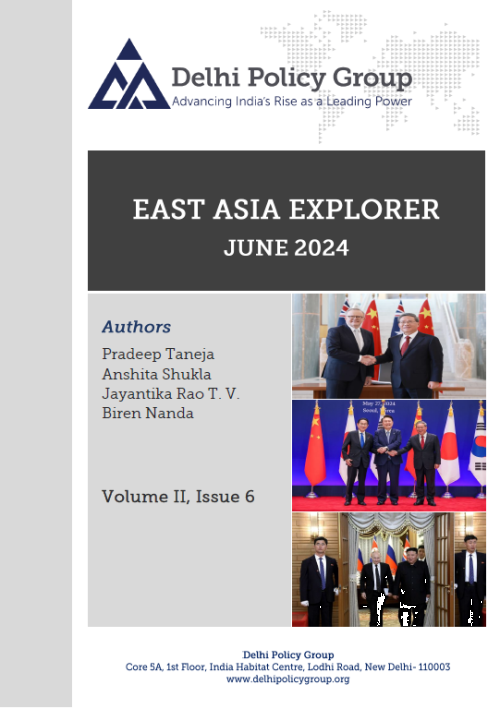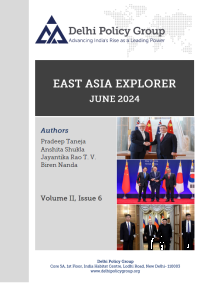East Asia Explorer
Date: July 04, 2024
By Ambassador Biren Nanda
, Jayantika Rao T. V.
, Pradeep Taneja, Anshita Shukla
The East Asia Explorer tracks evolving geopolitical trends, emerging security challenges, and progress towards regional integration in East Asia. It focuses on the ASEAN grouping, domestic and foreign policy developments in countries of East Asia and Oceania, great power contestation in the region, and India’s relations with ASEAN and its member countries.
In this issue, Dr. Pradeep Taneja examines the outcomes of Chinese Premier Li Qiang’s visit to Australia from June 15 – 18, 2024. He charts the evolution of Sino-Australian relations from their lowest point in 2017 to the present, which Li Qiang described as being “back on track.” He then contrasts the opening marked by Li Qiang’s visit with the intensified efforts by the Australian government to counter Chinese influence in the region.
Anshita Shukla reviews the Ninth Japan-China-ROK Trilateral Summit convened after a four-year-long hiatus in Seoul on May 27, 2024. She analyses the outcomes of the summit, the reasons behind the resumption of the trilateral, and the current state of bilateral relations between China, South Korea and Japan.
Jayantika Rao examines Russian President Vladimir Putin’s official visit to the Democratic People’s Republic of North Korea (DPRK) on June 18-19, and his talks with North Korea leader Kim Jong Un. Her review focuses on identifying the key takeaways from the summit and assessing the implications of the growing partnership between Russia and North Korea for regional and global security.
Finally, Amb. Nanda analyses the Thailand government’s decision to apply to join the BRICS bloc announced on May 28, 2024, in the context of Thailand’s application to join the OECD as well as the country’s relations with China under the BRI. He argues that Thailand’s pursuit of a BRICS membership emanates from its desire to assert its own identity and play a greater role in reforming the existing international order. On the other hand, Thailand has also applied for membership of the OECD in order to reap maximum benefits from the existing Western-led international order.
To read this East Asia Explorer, Vol. II, Issue 6, please see the PDF attached.
In this issue, Dr. Pradeep Taneja examines the outcomes of Chinese Premier Li Qiang’s visit to Australia from June 15 – 18, 2024. He charts the evolution of Sino-Australian relations from their lowest point in 2017 to the present, which Li Qiang described as being “back on track.” He then contrasts the opening marked by Li Qiang’s visit with the intensified efforts by the Australian government to counter Chinese influence in the region.
Anshita Shukla reviews the Ninth Japan-China-ROK Trilateral Summit convened after a four-year-long hiatus in Seoul on May 27, 2024. She analyses the outcomes of the summit, the reasons behind the resumption of the trilateral, and the current state of bilateral relations between China, South Korea and Japan.
Jayantika Rao examines Russian President Vladimir Putin’s official visit to the Democratic People’s Republic of North Korea (DPRK) on June 18-19, and his talks with North Korea leader Kim Jong Un. Her review focuses on identifying the key takeaways from the summit and assessing the implications of the growing partnership between Russia and North Korea for regional and global security.
Finally, Amb. Nanda analyses the Thailand government’s decision to apply to join the BRICS bloc announced on May 28, 2024, in the context of Thailand’s application to join the OECD as well as the country’s relations with China under the BRI. He argues that Thailand’s pursuit of a BRICS membership emanates from its desire to assert its own identity and play a greater role in reforming the existing international order. On the other hand, Thailand has also applied for membership of the OECD in order to reap maximum benefits from the existing Western-led international order.
To read this East Asia Explorer, Vol. II, Issue 6, please see the PDF attached.



